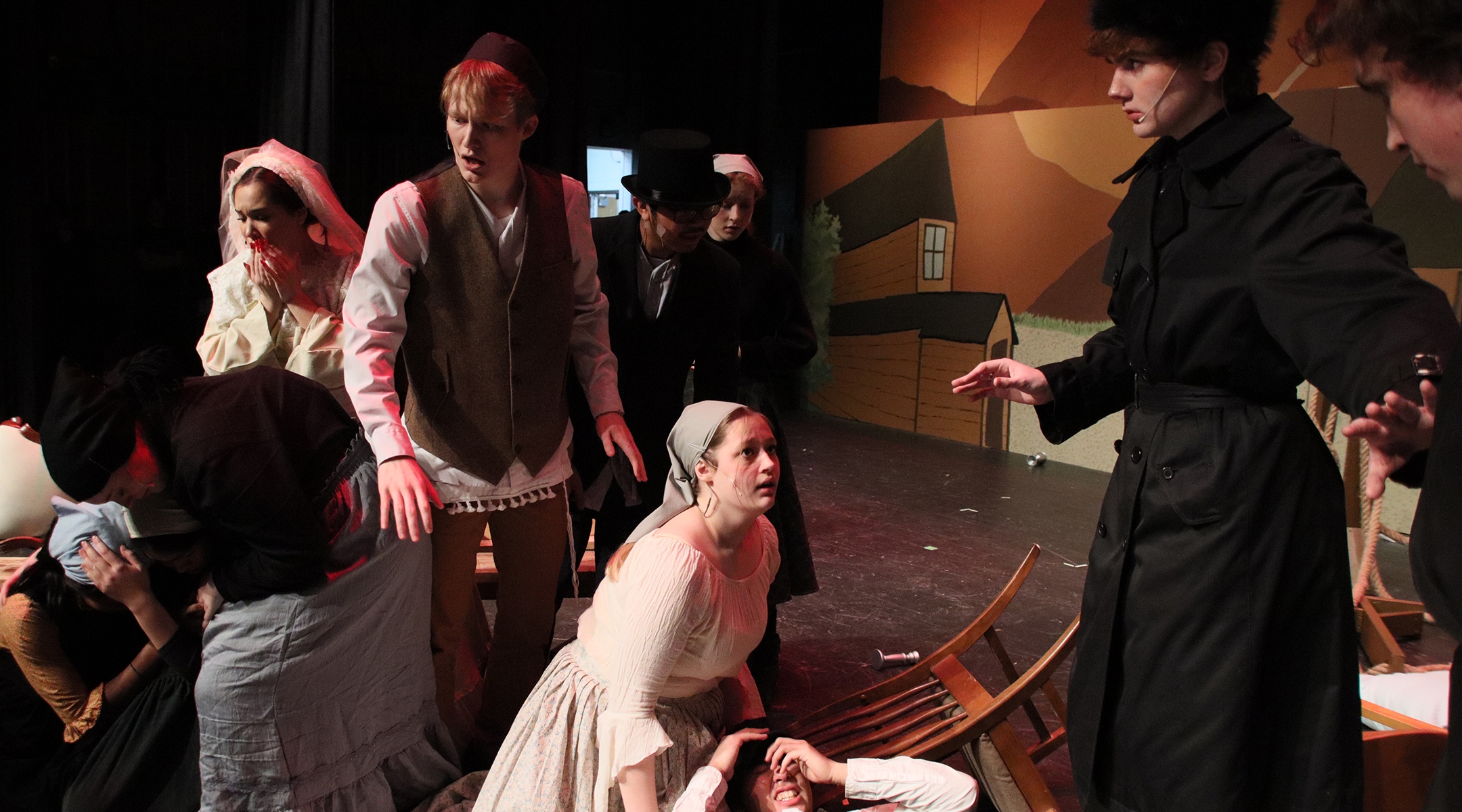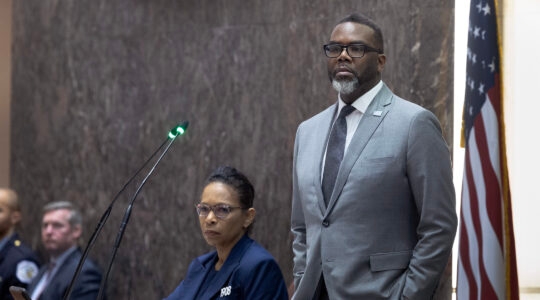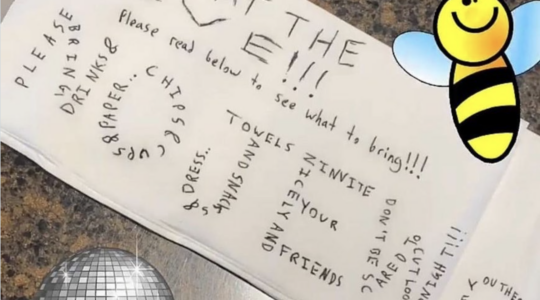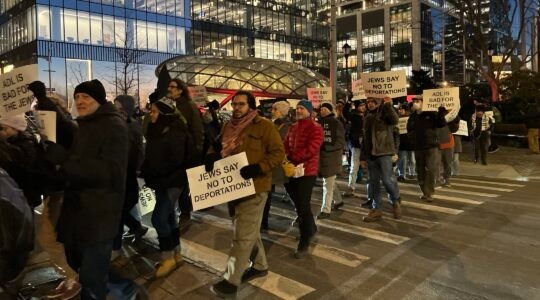This article was produced as part of JTA’s Teen Journalism Fellowship, a program that works with Jewish teens around the world to report on issues that affect their lives.
(JTA) — “Fiddler on the Roof” was a dream show for Abington Senior High School sophomore Samantha Alexander. “I never expected to [be] a part of it so early in my career,” Alexander said.
While the Pennsylvanian teen was excited about the show, she was hesitant to participate as one of the school’s few Jewish students, fearing that it would become a burden to represent her community.
“I was afraid if one of the actors or crew members made an offensive comment, how was I supposed to react as a Jewish person?” Alexander said. “Do I reveal myself? What should I do to ensure it doesn’t occur again? I considered resigning for the upcoming season because I didn’t think I had the mental stability to take on a show like this as one of the only Jewish students involved.”
Nevertheless, Alexander joined the show as the student director, and by the time she was choosing her outfit for opening night, she felt ready to embrace her Jewish culture. “I crafted a beaded bracelet in the colors of my flier design with a silver Star of David charm attached to it, reminding me that we’re not going to hide anymore,” Alexander said. “It was the first time I wore Jewish jewelry, in any form, outside of an all-Jewish environment.”
“Fiddler on the Roof” is historically one of the most popular titles for high school theater departments, and a classic representation of Judaism in pop culture. This year, schools and professional theaters alike faced the challenge of producing a show about Eastern European Jews in the midst of the war in Gaza, spreading criticism of Israel and a global spike in antisemitism.
For some involved in the productions, like Alexander, “Fiddler” raises questions about Jewish identity in a fraught time. For others, its messages can’t be separated from current events.
David Stern, artistic director of Vermont’s Wild Goose Players, played Tevye in the theater’s recent production of “Fiddler.” Although Wild Goose performed the show in 2024, the decision to stage the musical was made months before the war began.
“We were asked, ‘Is it okay to portray Jewish suffering in a time when Israel is causing so much suffering?’” Stern wrote in the Brattleboro Reformer, a local news site, about the regional theater’s production. “In my mind, ‘Fiddler’ is both a useful jumping-off point for dialogue about a whole host of issues, from antisemitism to the Palestinian right of return, and a beautiful show evincing a classic struggle of the human condition.”
In Kentucky, Anya Petrone Slepyan, a young Jewish writer, wrote about the film version of the musical for a news site focusing on rural life. “‘Fiddler on the Roof’ and the history it represents demand that we have empathy for every person violently removed from their home,” she wrote in an author’s note appended to the article, which appeared in December 2023.
Abington Senior High School teachers Lori Wolf and Tim Myers co-directed the show this year and, like Stern, selected it in the spring of 2023. “It felt like the timing was right for the school,” said Myers, who is Lutheran. Wolf is Jewish. The show “provided a chance for us to dig deeper into issues than previous shows,” Myers said.
Added Wolf: “We felt we could work with them to make modern-day connections, though at the time, I really foresaw mainly talking about the conflict in Ukraine and immigration issues. Once Oct. 7 happened, the show took on a whole new meaning for many of us involved in the production.”
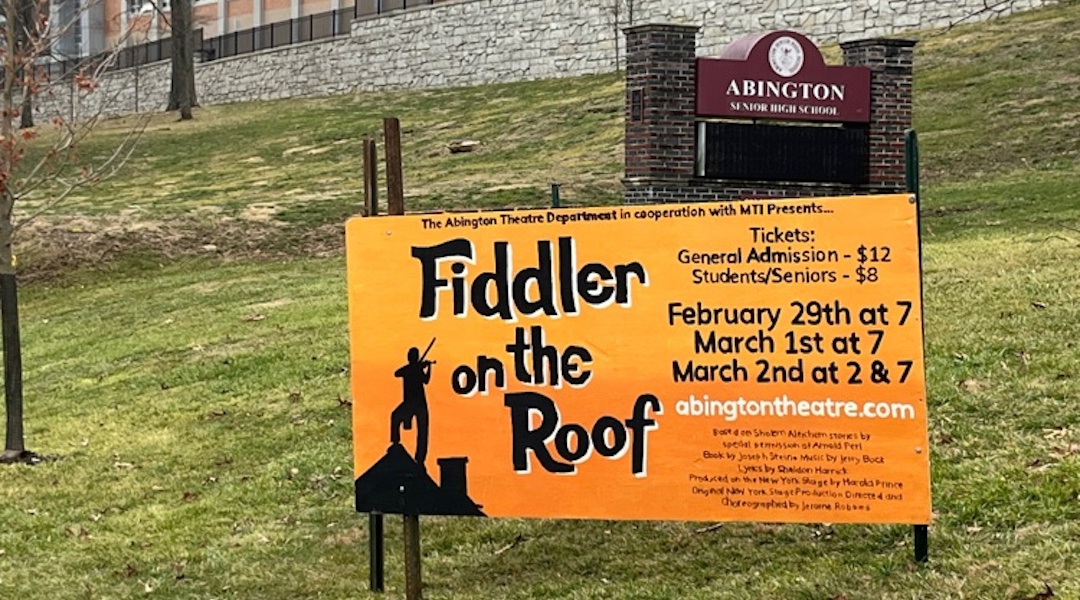
A sign at Abington Senior High School advertises the winter 2024 production of “Fiddler on the Roof.” (Via X)
Abington Senior High School is located in the Old York Road suburbs of Pennsylvania. There are over 25,000 Jews in the greater Old York Road community (approximately 15% of the total population) according to the Jewish Federation of Greater Philadelphia. It is the district’s only public high school and has nearly 2,800 students, many of whom participated in the production. “We have over 150 students involved between the cast, stage/costume crew and the pit orchestra,” Wolf said.
Auditions and rehearsals began less than two months after the Hamas attacks of Oct. 7. Wolf and Myers’ interpretation of the show embraced the script’s moments of joy while highlighting the underlying narrative of suffering, including an antisemitic pogrom. “‘Fiddler’ is so much fun and has so many funny lines, but I wanted the painful parts to hit the audience hard,” Wolf said. “This feeling was probably heightened by the Israel-Hamas conflict.”
Current events were not addressed in rehearsals, but they informed the way the team approached the subject matter. “We did not directly talk about the conflict, but it definitely added importance to our rehearsal process,” Wolf said. “A few Jewish students had been lightly concerned last spring that their peers might joke about something harmful or say something careless once rehearsals got underway. Now, it became absolutely imperative that everyone in the cast and crew handled the subject with utmost sensitivity and care.”
After the directors announced the show, they quickly developed plans to offer enrichment opportunities for students to learn about and engage with the culture they would be depicting. The team invited Jewish community leaders to speak with the students involved in the production. “As one of the only Jewish students involved, I wanted to ensure that the Jewish concepts in the show were correct,” Alexander said. “We had leaders from three different branches of Judaism: a rabbi from a local Reform synagogue, my Conservative cantor and a rebbetzin from Chabad.”
Abington senior Shane Reilly, who played Tevye, expressed his appreciation for these opportunities as a non-Jewish actor. “I had nothing but questions and I was met with answers and understanding,” Reilly said. “All my life, I have had one worldview, a vaguely Christian American white kid, but by looking through the eyes of a 60-year-old Jewish father of five daughters, [it] made my world just that much smaller.”
Beyond guest speakers, the directors coordinated additional opportunities to educate the students about Jewish culture. “We brought in authentic clothing and ritual items to show the students,” Wolf said. “We invited them to take part in a real Shabbat ceremony” at the school.
“I had a fair bit to learn if I wanted to portray an accurate Tevye, an honor and responsibility that I did not take lightly,” Reilly said. “The Shabbat ceremony turned all that I learned about the Jewish culture and faith from a character study to a reality I wasn’t previously privy to.”
The directors also planned activities to confront and combat antisemitism to cultivate a safe rehearsal environment. “Before Oct. 7, we had already set up peer anti-bias training with the Anti-Defamation League,” Myers said.
Despite this work, actors did not always take the subject matter seriously, particularly when rehearsing a scene depicting the pogrom. “Probably the third time we went through it, the kids were starting to joke around, handling uncomfortable material the way teenagers often do, by trying to laugh through it,” Wolf said. “I stopped rehearsal, sat them all down, and told them that this would be the last time that we would ever have any kind of joking anywhere near this scene. They understood and they didn’t do it again, and that scene became a very powerful moment in our show.”
Following months of rehearsal, the production was performed four times for the Abington community from Feb. 29 to March 2. In the show’s program, the directors acknowledged the social context of telling its story at this point in history.
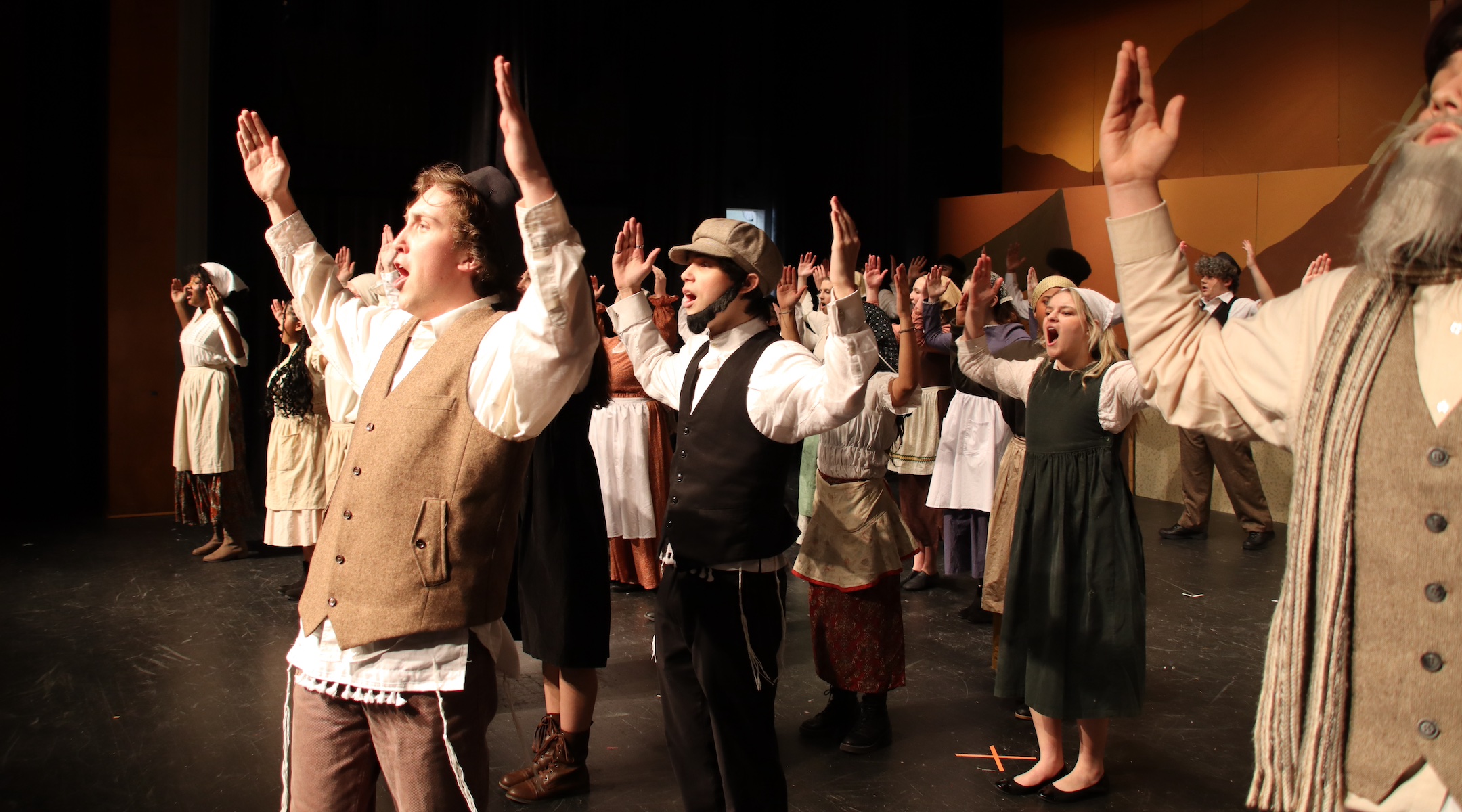
“Of course, the war was a topic in the beginning, but it did not stick,” said one of the students starring in Abington Senior High’s production of “Fiddler on the Roof.” “I was immersed into a culture of family, values and traditions, not of war.” (Courtesy of Lori Hasa)
“As we look at local and global events that have occurred recently, this message of love and life is of utmost importance,” Myers said in his director’s note. “How are the traditions we have, from a variety of times and places, helping us to promote love of friend, partner, community, nation, world? That is a hard question to ask, and a hard question to answer.”
Wolf is unsure how non-Jewish audience members contextualized the show. “I don’t know if they think often about the conflict or if they will make any connections at all, or if they do, what connections they might make,” Wolf said. “Personally, it has been impossible for me to work on this show and not think about the conflict. I hope they appreciated and felt compassion for the Jews of Anatevka.”
Reilly felt that his process as a non-Jewish actor was generally removed from the war. “Of course, the war was a topic in the beginning, but it did not stick,” Reilly said. “I was immersed into a culture of family, values and traditions, not of war.”
Wolf hopes Jewish audience members found the show’s message of resilience particularly cathartic in a time of rampant antisemitism.
“For the Jewish members of the audience, I hope this brought some pride, healing and strength to see the familiar traditions, story and music portrayed onstage by a diverse and modern group of students,” Wolf said. “At the end of the show, I hope they saw themselves in Tevye and his family; Tevye picks up his heavy cart and belongings and traditions, and he and his family continue on.”
JTA has documented Jewish history in real-time for over a century. Keep our journalism strong by joining us in supporting independent, award-winning reporting.
